Curiosity Kills Habits
Have you ever noticed that curiosity can be a game-changer when it comes to breaking bad habits? It’s true! Some might say that curiosity is the secret sauce to success when it comes to changing your ways. So, if you’re looking to kick a bad habit to the curb, unleash your curiosity by trying out the following activities.
Remember to do them consciously, with full awareness.
- Eat something you have never eaten before. It can be a great way to expand your palate and discover new flavours.
- Sit at a different table or chair. Moving to a new place can be exciting and enjoyable!
- Pick up a new book to get lost in.
- Watch the sky for half an hour. Try making cloud figures. Relive your childhood experiences.
- Take a different commute to work. Make sure to check out the recently opened stores and walk through the various alleys while making mental observations.
- Stop every two hours and consciously breathe. Take a mindful break.
- Switch supermarkets.
- You can visit a local park, playground or any place where children are playing and observe them. Just sit and enjoy watching them having fun.
Be Curious. Be Energetic. Be Alive.
Also read about Overthinking – https://http://thevibrantaura.in/index.php/2024/01/05/overthinking/
Beauty In Chaos
Life can be a bit like a puzzle, right? Sometimes it gets all mixed up and feels a bit chaotic. But guess what? Even in the messiest moments, there’s something beautiful to discover about yourself.
1. It’s Okay to Feel a Little Lost
Ever felt like everything’s a bit crazy inside your head? Totally okay! It’s like finding your way in a big, exciting maze. The first step is saying, “Hey, it’s okay to feel this way.”
2. Being Strong is Like Doing a Cool Dance
Imagine you’re dancing in the rain. Life’s challenges are a bit like that rain – unexpected, but you can totally dance through it. Every tough moment? It’s like a dance move that makes you stronger.
3. Friends Help You Find Your Way
In this maze of life, having friends who get it is super important. When we share our stories, we realize we’re not alone. Friends make the journey less bumpy.
4. Being You is the Best Part
You know what’s super cool? Being you, with all your quirks and uniqueness. Accepting yourself is like saying, “Hey, I’m awesome just as I am.”
5. Let’s Celebrate the Small Wins
Life’s like a big party, and even the smallest victories deserve confetti! Let’s celebrate the good moments, no matter how tiny. Each one adds sparkle to our journey.
So, here’s to finding beauty in the chaos, dancing through the rain, and discovering the awesome person you are. Remember, you’re not alone, and there’s good stuff waiting for you in every twist of this adventure!
Connect with Vibrant Aura by Sejal for more guidance and suggestions for the journey towards mental well-being.
https://http://thevibrantaura.in/index.php/about-me/
Emotional Regulation
Mastering emotional regulation is crucial amidst life’s chaos. 🌪️
Key strategies include mindfulness, deep breathing, and cognitive reframing. Consider connecting with a mental health professional for personalised support if challenges persist. Your well-being is a priority, and seeking help is a sign of strength.
Connect with Vibrant Aura by Sejal.
Also, read about- https://http://thevibrantaura.in/index.php/2023/11/24/the-intricate-dance-of-mental-health-and-physical-pain/
Self-care Bingo
Health care journeys are not always easy and self-care is one item that happens to get overlooked often. In addition to simple healthcare, even self-care can take a back seat to caring for your family or your career. This can lead to stress, anxiety, frustration, and even burnout. If you want to find a way to reconnect with yourself, your family and even your friends, taking care of yourself is the first step. It is important to make your physical and mental health a priority.
How to Play Selfcare Bingo:
To play self-care bingo you can print out this bingo card, or even draw one by hand. The board will be full of self-care ideas and tasks you can use to fill each space. You can set a time limit for yourself or even for the group that fits in with your schedules. This can be as short as a week, or as long as a month.
Every time you complete an action on the board, mark off the square, just like in regular bingo. Once you or any other player completes a line across, up and down, or diagonally, it’s a win! Award yourself with something nice that lifts your mood, or if playing with others, they win the group pot.
Overthinking.
Overthinking often involves two destructive thought patterns like:
1)Ruminating & Incessant or Persistent worrying
- Ruminating involves dwelling on the past.
Thoughts like: I shouldn’t have said those things, or My parents didn’t teach me how to be confident.
- Persistent worrying involves negative, often catastrophic predictions about the future.
Thoughts like: I’m going to embarrass myself during the presentation, or I know I won’t ever have enough money to retire.
Like all habits, changing your destructive thought patterns can be a challenge. But, with consistent practice, you can train your brain to think differently. Break the chaos connect with Vibrant Aura by Sejal at: https://http://thevibrantaura.in/index.php/about-me/
Unveiling the Intricacies of Defense Mechanisms One by One.
Defence mechanisms are a way for the mind to cope with stress or difficult feelings. They are unconscious mechanisms, which means that a person uses them without realising it.
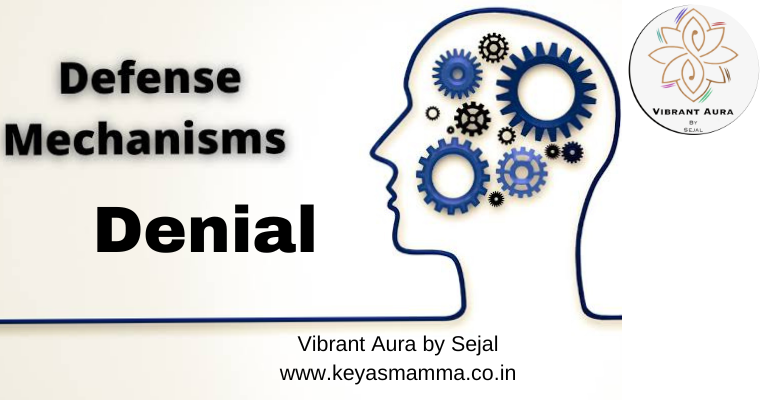
Denial: The Protective Veil
This involves a person not recognizing the reality of a stressful situation in order to protect themselves from overwhelming fear or anxiety.
Consider a person diagnosed with a severe health condition. In denial, they might adamantly reject the diagnosis, insisting that the medical professionals have made a mistake. By clinging to this belief, they create a temporary shield against the overwhelming reality of their health challenge.
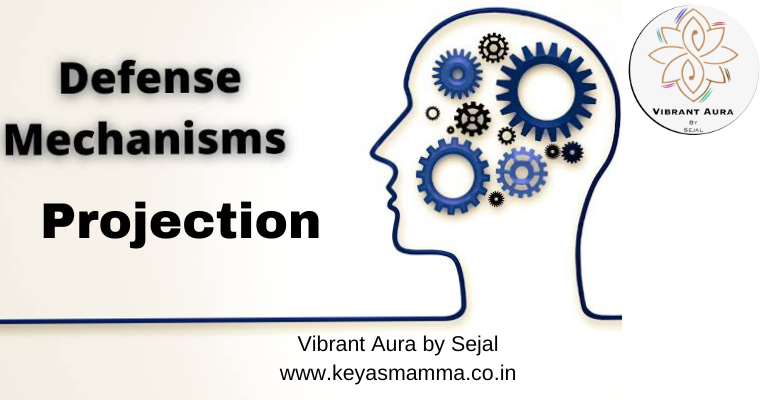
Projection: Mirroring Shadows
Projection isn’t something people do deliberately, so it can be hard to spot.This defence mechanism can appear in any type of relationship or setting.
Picture an individual struggling with feelings of jealousy towards a colleague’s success. Instead of acknowledging their envy, they might project these feelings onto the colleague, accusing them of being envious. This externalisation allows the individual to distance themselves from the uncomfortable emotion they are experiencing.
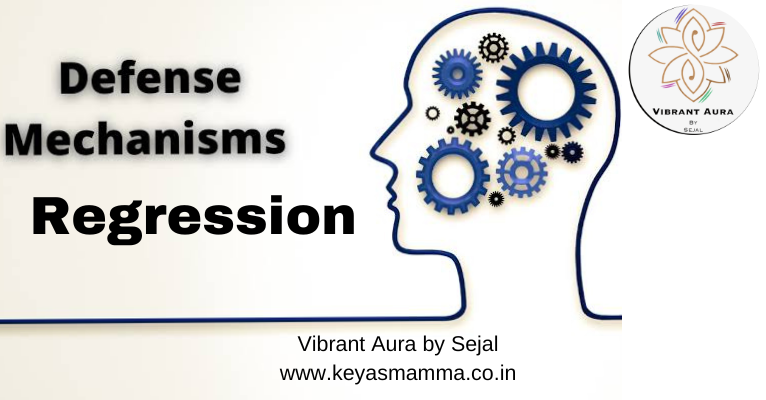
Regression: Nostalgic Retreat
It is uniquely characterised by age-inappropriate behaviours and impulses that typically manifest as a way of communicating distress. Regression is thought to be a coping mechanism of choice for some individuals because it allows them to mentally revert to an age when they feelcomforted, safe, and secure.
A person facing significant stress at work may start displaying behaviours reminiscent of their youth, such as seeking comfort from a parent or engaging in childhood hobbies. This regression offers a retreat to a simpler time, providing a temporary escape from the complexities of adult responsibilities.
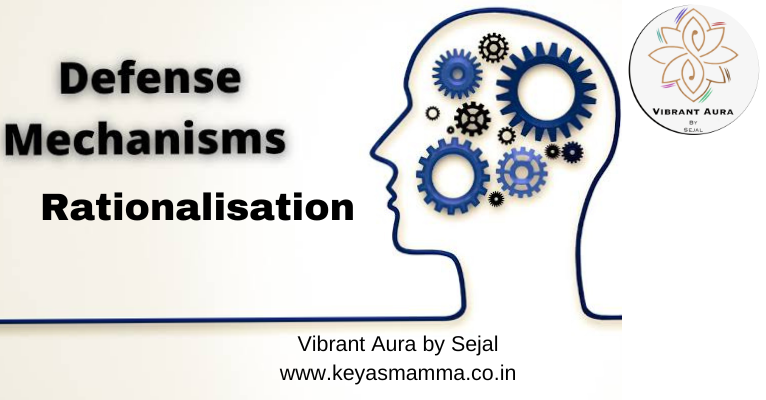
Rationalisation: Crafting a Coherent Narrative
This involves explaining an unacceptable behaviour or feeling in a rational or logical way. It is to avoid the true explanation.
Imagine someone who, after failing to secure a job, rationalises the situation by convincing themselves that the job wasn’t a good fit anyway. By constructing a logical explanation, they protect their self-esteem and avoid confronting the possibility of personal shortcomings.
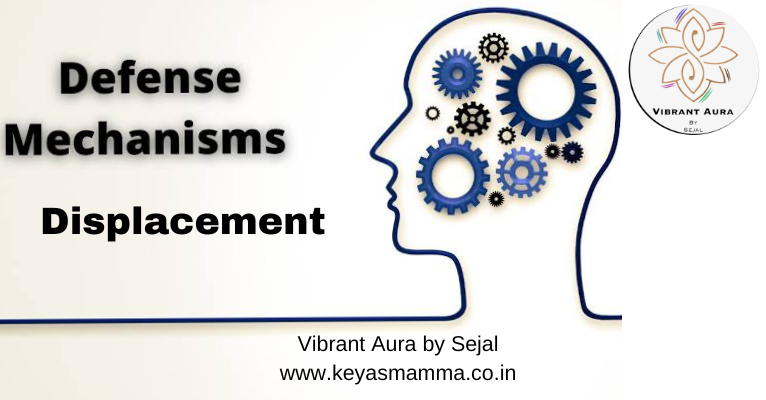
Displacement: Redirecting Emotional Forces
It involves the redirection of an emotion or impulse from its original source often a person or a situation that might be challenging or threatening to a safer or more acceptable outlet. The primary purpose of this unconscious process is to reduce anxiety and to maintain psychic equilibrium.
A person frustrated by their boss may go home and take out their anger on family members or become irritable with friends. By displacing the emotional energy from the workplace to a seemingly safer environment, they can momentarily alleviate their stress without confronting the source directly.
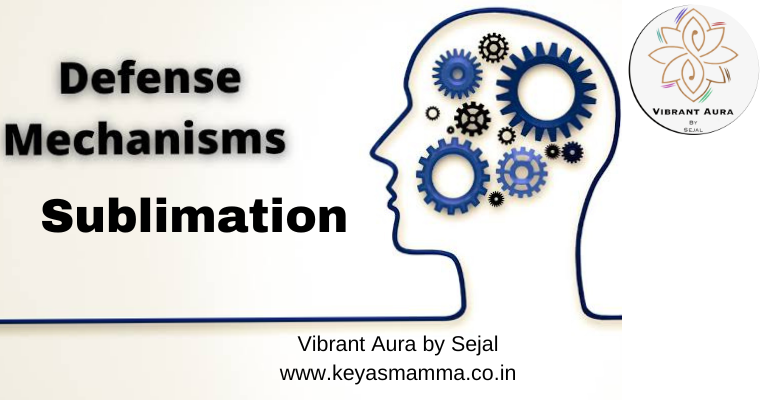
Sublimation: Transforming Pain into Productivity
It involves channelling unwanted or unacceptable urges into an admissible or productive outlet.
Consider an artist who channels their inner turmoil and emotional struggles into their work. By expressing their pain through art, they sublimate negative emotions into a creative outlet, turning personal challenges into something constructive and inspiring.
Break the chaos. Book your first free counselling session with Vibrant Aura by Sejal.